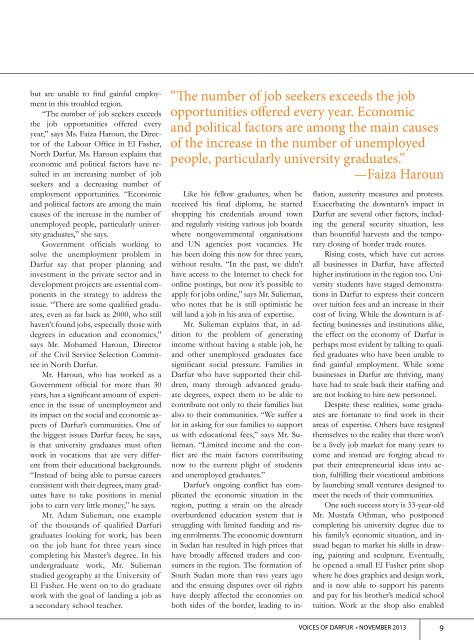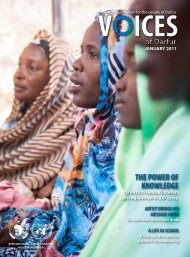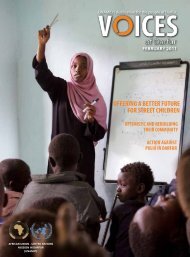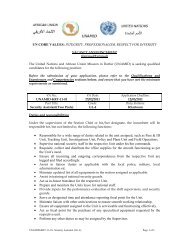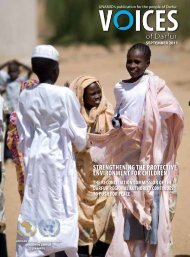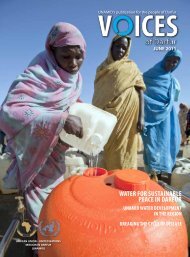Darfur Dances
Download the magazine (PDF) here. - Unamid
Download the magazine (PDF) here. - Unamid
- No tags were found...
You also want an ePaper? Increase the reach of your titles
YUMPU automatically turns print PDFs into web optimized ePapers that Google loves.
ut are unable to find gainful employment<br />
in this troubled region.<br />
“The number of job seekers exceeds<br />
the job opportunities offered every<br />
year,” says Ms. Faiza Haroun, the Director<br />
of the Labour Office in El Fasher,<br />
North <strong>Darfur</strong>. Ms. Haroun explains that<br />
economic and political factors have resulted<br />
in an increasing number of job<br />
seekers and a decreasing number of<br />
employment opportunities. “Economic<br />
and political factors are among the main<br />
causes of the increase in the number of<br />
unemployed people, particularly university<br />
graduates,” she says.<br />
Government officials working to<br />
solve the unemployment problem in<br />
<strong>Darfur</strong> say that proper planning and<br />
investment in the private sector and in<br />
development projects are essential components<br />
in the strategy to address the<br />
issue. “There are some qualified graduates,<br />
even as far back as 2000, who still<br />
haven’t found jobs, especially those with<br />
degrees in education and economics,”<br />
says Mr. Mohamed Haroun, Director<br />
of the Civil Service Selection Committee<br />
in North <strong>Darfur</strong>.<br />
Mr. Haroun, who has worked as a<br />
Government official for more than 30<br />
years, has a significant amount of experience<br />
in the issue of unemployment and<br />
its impact on the social and economic aspects<br />
of <strong>Darfur</strong>’s communities. One of<br />
the biggest issues <strong>Darfur</strong> faces, he says,<br />
is that university graduates must often<br />
work in vocations that are very different<br />
from their educational backgrounds.<br />
“Instead of being able to pursue careers<br />
consistent with their degrees, many graduates<br />
have to take positions in menial<br />
jobs to earn very little money,” he says.<br />
Mr. Adam Sulieman, one example<br />
of the thousands of qualified <strong>Darfur</strong>i<br />
graduates looking for work, has been<br />
on the job hunt for three years since<br />
completing his Master’s degree. In his<br />
undergraduate work, Mr. Sulieman<br />
studied geography at the University of<br />
El Fasher. He went on to do graduate<br />
work with the goal of landing a job as<br />
a secondary school teacher.<br />
“The number of job seekers exceeds the job<br />
opportunities offered every year. Economic<br />
and political factors are among the main causes<br />
of the increase in the number of unemployed<br />
people, particularly university graduates.”<br />
—Faiza Haroun<br />
Like his fellow graduates, when he<br />
received his final diploma, he started<br />
shopping his credentials around town<br />
and regularly visiting various job boards<br />
where nongovernmental organisations<br />
and UN agencies post vacancies. He<br />
has been doing this now for three years,<br />
without results. “In the past, we didn’t<br />
have access to the Internet to check for<br />
online postings, but now it’s possible to<br />
apply for jobs online,” says Mr. Sulieman,<br />
who notes that he is still optimistic he<br />
will land a job in his area of expertise.<br />
Mr. Sulieman explains that, in addition<br />
to the problem of generating<br />
income without having a stable job, he<br />
and other unemployed graduates face<br />
significant social pressure. Families in<br />
<strong>Darfur</strong> who have supported their children,<br />
many through advanced graduate<br />
degrees, expect them to be able to<br />
contribute not only to their families but<br />
also to their communities. “We suffer a<br />
lot in asking for our families to support<br />
us with educational fees,” says Mr. Sulieman.<br />
“Limited income and the conflict<br />
are the main factors contributing<br />
now to the current plight of students<br />
and unemployed graduates.”<br />
<strong>Darfur</strong>’s ongoing conflict has complicated<br />
the economic situation in the<br />
region, putting a strain on the already<br />
overburdened education system that is<br />
struggling with limited funding and rising<br />
enrolments. The economic downturn<br />
in Sudan has resulted in high prices that<br />
have broadly affected traders and consumers<br />
in the region. The formation of<br />
South Sudan more than two years ago<br />
and the ensuing disputes over oil rights<br />
have deeply affected the economies on<br />
both sides of the border, leading to inflation,<br />
austerity measures and protests.<br />
Exacerbating the downturn’s impact in<br />
<strong>Darfur</strong> are several other factors, including<br />
the general security situation, less<br />
than bountiful harvests and the temporary<br />
closing of border trade routes.<br />
Rising costs, which have cut across<br />
all businesses in <strong>Darfur</strong>, have affected<br />
higher institutions in the region too. University<br />
students have staged demonstrations<br />
in <strong>Darfur</strong> to express their concern<br />
over tuition fees and an increase in their<br />
cost of living. While the downturn is affecting<br />
businesses and institutions alike,<br />
the effect on the economy of <strong>Darfur</strong> is<br />
perhaps most evident by talking to qualified<br />
graduates who have been unable to<br />
find gainful employment. While some<br />
businesses in <strong>Darfur</strong> are thriving, many<br />
have had to scale back their staffing and<br />
are not looking to hire new personnel.<br />
Despite these realities, some graduates<br />
are fortunate to find work in their<br />
areas of expertise. Others have resigned<br />
themselves to the reality that there won’t<br />
be a lively job market for many years to<br />
come and instead are forging ahead to<br />
put their entrepreneurial ideas into action,<br />
fulfilling their vocational ambitions<br />
by launching small ventures designed to<br />
meet the needs of their communities.<br />
One such success story is 33-year-old<br />
Mr. Mustafa Othman, who postponed<br />
completing his university degree due to<br />
his family’s economic situation, and instead<br />
began to market his skills in drawing,<br />
painting and sculpture. Eventually,<br />
he opened a small El Fasher print shop<br />
where he does graphics and design work,<br />
and is now able to support his parents<br />
and pay for his brother’s medical school<br />
tuition. Work at the shop also enabled<br />
VOICES OF DARFUR • NOVEMBER 2013<br />
9


